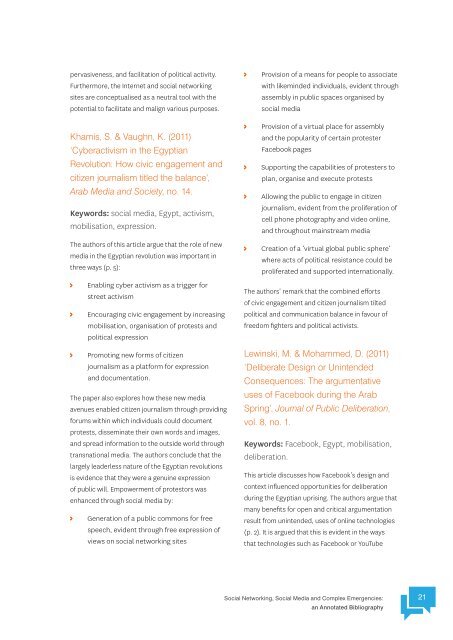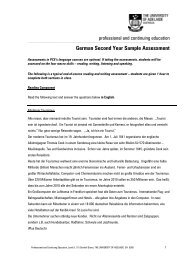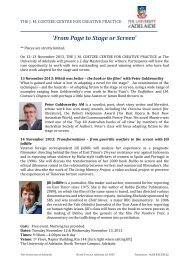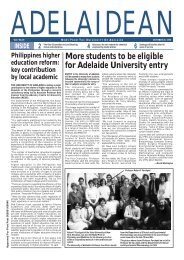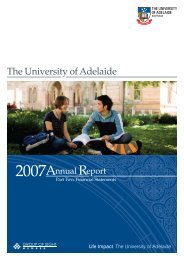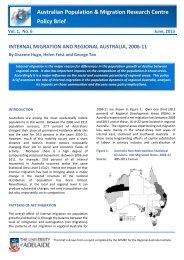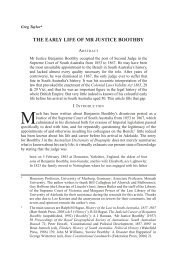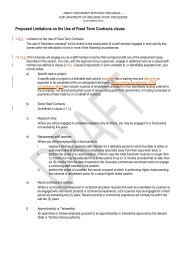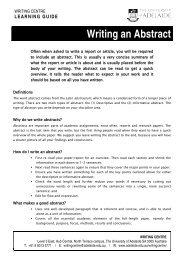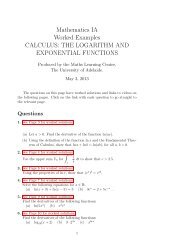Social Networking, Social Media and Complex Emergencies: an ...
Social Networking, Social Media and Complex Emergencies: an ...
Social Networking, Social Media and Complex Emergencies: an ...
You also want an ePaper? Increase the reach of your titles
YUMPU automatically turns print PDFs into web optimized ePapers that Google loves.
pervasiveness, <strong><strong>an</strong>d</strong> facilitation of political activity.<br />
Furthermore, the Internet <strong><strong>an</strong>d</strong> social networking<br />
sites are conceptualised as a neutral tool with the<br />
potential to facilitate <strong><strong>an</strong>d</strong> malign various purposes.<br />
Khamis, S. & Vaughn, K. (2011)<br />
‘Cyberactivism in the Egypti<strong>an</strong><br />
Revolution: How civic engagement <strong><strong>an</strong>d</strong><br />
citizen journalism titled the bal<strong>an</strong>ce’,<br />
Arab <strong>Media</strong> <strong><strong>an</strong>d</strong> Society, no. 14.<br />
Keywords: social media, Egypt, activism,<br />
mobilisation, expression.<br />
The authors of this article argue that the role of new<br />
media in the Egypti<strong>an</strong> revolution was import<strong>an</strong>t in<br />
three ways (p. 5):<br />
ƸƸ<br />
ƸƸ<br />
ƸƸ<br />
ƸƸ<br />
ƸƸ<br />
Provision of a me<strong>an</strong>s for people to associate<br />
with likeminded individuals, evident through<br />
assembly in public spaces org<strong>an</strong>ised by<br />
social media<br />
Provision of a virtual place for assembly<br />
<strong><strong>an</strong>d</strong> the popularity of certain protester<br />
Facebook pages<br />
Supporting the capabilities of protesters to<br />
pl<strong>an</strong>, org<strong>an</strong>ise <strong><strong>an</strong>d</strong> execute protests<br />
Allowing the public to engage in citizen<br />
journalism, evident from the proliferation of<br />
cell phone photography <strong><strong>an</strong>d</strong> video online,<br />
<strong><strong>an</strong>d</strong> throughout mainstream media<br />
Creation of a ‘virtual global public sphere’<br />
where acts of political resist<strong>an</strong>ce could be<br />
proliferated <strong><strong>an</strong>d</strong> supported internationally.<br />
ƸƸ<br />
ƸƸ<br />
Enabling cyber activism as a trigger for<br />
street activism<br />
Encouraging civic engagement by increasing<br />
mobilisation, org<strong>an</strong>isation of protests <strong><strong>an</strong>d</strong><br />
political expression<br />
The authors’ remark that the combined efforts<br />
of civic engagement <strong><strong>an</strong>d</strong> citizen journalism tilted<br />
political <strong><strong>an</strong>d</strong> communication bal<strong>an</strong>ce in favour of<br />
freedom fighters <strong><strong>an</strong>d</strong> political activists.<br />
ƸƸ<br />
Promoting new forms of citizen<br />
journalism as a platform for expression<br />
<strong><strong>an</strong>d</strong> documentation.<br />
The paper also explores how these new media<br />
avenues enabled citizen journalism through providing<br />
forums within which individuals could document<br />
protests, disseminate their own words <strong><strong>an</strong>d</strong> images,<br />
<strong><strong>an</strong>d</strong> spread information to the outside world through<br />
tr<strong>an</strong>snational media. The authors conclude that the<br />
largely leaderless nature of the Egypti<strong>an</strong> revolutions<br />
is evidence that they were a genuine expression<br />
of public will. Empowerment of protestors was<br />
enh<strong>an</strong>ced through social media by:<br />
ƸƸ<br />
Generation of a public commons for free<br />
speech, evident through free expression of<br />
views on social networking sites<br />
Lewinski, M. & Mohammed, D. (2011)<br />
‘Deliberate Design or Unintended<br />
Consequences: The argumentative<br />
uses of Facebook during the Arab<br />
Spring’, Journal of Public Deliberation,<br />
vol. 8, no. 1.<br />
Keywords: Facebook, Egypt, mobilisation,<br />
deliberation.<br />
This article discusses how Facebook’s design <strong><strong>an</strong>d</strong><br />
context influenced opportunities for deliberation<br />
during the Egypti<strong>an</strong> uprising. The authors argue that<br />
m<strong>an</strong>y benefits for open <strong><strong>an</strong>d</strong> critical argumentation<br />
result from unintended, uses of online technologies<br />
(p. 2). It is argued that this is evident in the ways<br />
that technologies such as Facebook or YouTube<br />
<strong>Social</strong> <strong>Networking</strong>, <strong>Social</strong> <strong>Media</strong> <strong><strong>an</strong>d</strong> <strong>Complex</strong> <strong>Emergencies</strong>:<br />
<strong>an</strong> Annotated Bibliography<br />
21


